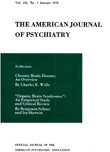SUBSEQUENT NATION-WIDE EFFECTS OF WORLD WAR II NAVY PSYCHIATRIC TRAINING PROGRAM
Abstract
1. Questionnaires were sent to physicians who were enrolled in the Navy's 3 months' intensive training courses in neuropsychiatry during World War II. Of the 221 "live" questionnaires sent to 36 states and the District of Columbia there were 189 returns, or 86%.
2. The returns indicate that 103 (55%) of the group have continued to date in the practice of neuropsychiatry.
3. About 85% of the group continuing in neuropsychiatry indicate almost exclusive attention to psychiatry while only about 5% state their time is given mostly to neurology.
4. More than two-thirds of the present neuropsychiatric group report that the Navy training course influenced the nature of their present practice.
5. Ninety percent of the present neuropsychiatric group stated that they found the training helpful in their present practice. All but one physician in fields other than psychiatry stated that the training was helpful in their present practice—over half of them, emphatically so.
6. Prior experience or training in neuropsychiatry was indicated by 43% of the whole group, but detailed analysis of comments shows that such training was often quite limited. About two-thirds (69%) of the total group regarded the training as "basic orientation."
7. Subsequent neuropsychiatric training, following demobilization, is reported by 89% of the continuing neuropsychiatric group, 35% of whom indicate Board certification.
Access content
To read the fulltext, please use one of the options below to sign in or purchase access.- Personal login
- Institutional Login
- Sign in via OpenAthens
- Register for access
-
Please login/register if you wish to pair your device and check access availability.
Not a subscriber?
PsychiatryOnline subscription options offer access to the DSM-5 library, books, journals, CME, and patient resources. This all-in-one virtual library provides psychiatrists and mental health professionals with key resources for diagnosis, treatment, research, and professional development.
Need more help? PsychiatryOnline Customer Service may be reached by emailing [email protected] or by calling 800-368-5777 (in the U.S.) or 703-907-7322 (outside the U.S.).



